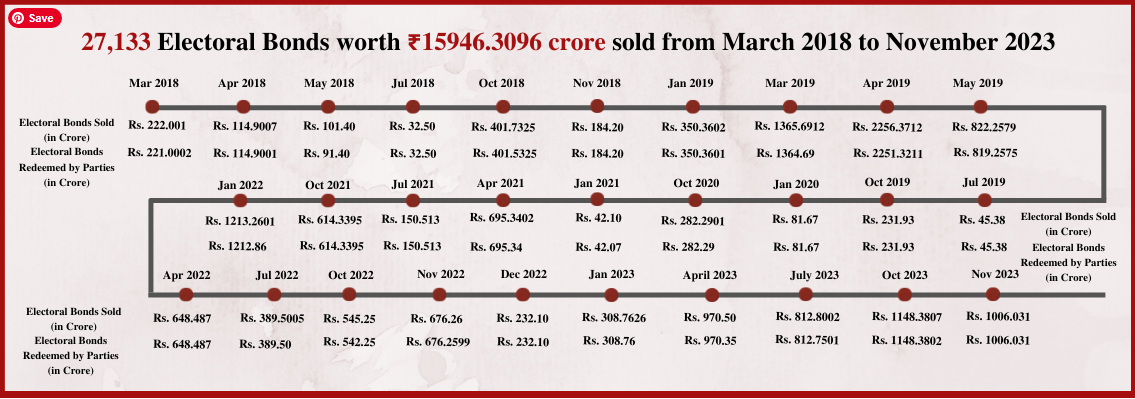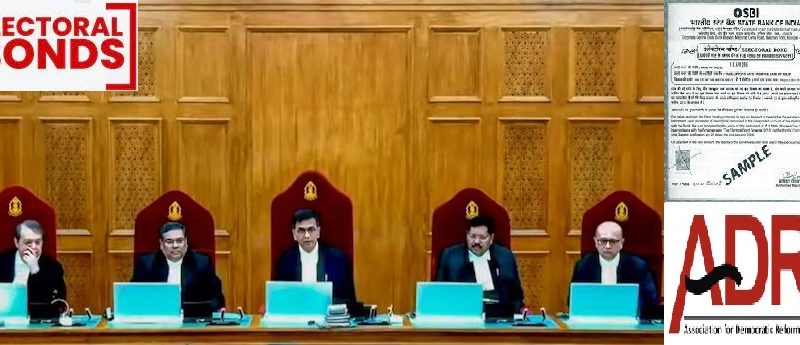A BIG JOLT TO THE GOVERNMENT :THE ELECTORAL BONDS SCHME DECLARED UNCOSTITUTIONAL BY SUPREME COURT; SBI ORDERED TO FURNISH DETAILS OF THE PURCHASES OF BOND.

-By Usha Rawat
NEW DELHI, 15 FEBRUARY. A five-judge Constitution Bench of the Supreme Court of India comprising Justices Chief Justice DY Chandrachud, and Justices Sanjiv Khanna, BR Gavai, JB Pardiwala, and Manoj Misra in a petition filed by Association for Democratic Reforms (ADR) has given a landmark judgment holding the anonymous, unregulated and unlimited funding through electoral bonds and companies as unconstitutional.
The court relied on the fact that such a system of political funding which is completely anonymous, unchecked and unlimited goes against the basic principles of citizens’ Right to know under Article 19(1)(a) of the Constitution and free and fair election and therefore the amendments brought through the Finance Act,2017 and passed as Money bill to Section 29C of RP Act,1951, Sections 181 & 183(3) of the Companies Act,2013, Section 13A(b) of the Income Tax Act,1961 were struck down as being violative of the Constitution. The court observed the principle that the citizens have a duty to hold the government of the day accountable for their actions and inactions, and they can effectively fulfill this duty only if the government is open and not clothed in secrecy.
ADR had filed the petition in the Supreme Court on 4th September 2017. Since then, six applications were filed for stay on the purchase of bonds and for early adjudication of the case i.e. on 5th March 2019, 29th November 2019, 26th October 2020, 9th March 2021, 15th November 2022 and 1st December 2022. Today’s verdict comes after nearly a wait of more than six years when the Supreme Court of India heard the petition challenging the amendments brought by the Finance Act, 2017 for three consecutive days i.e. 31st October, 1st & 2nd November 2023.
The judgment relied on two key issues namely:
- Whether the non-disclosure of information on voluntary contributions to political parties according to the electoral bond scheme and the amendments to Section 29C of the Representation of the People Act, Section 183(3) of the Companies Act, Section 13A(b) of the Income Tax Act is violative of the Right to Information under Article 19(1)(a) of the Constitution;
- Whether unlimited corporate funding to political parties as envisaged by the amendment to Section 182(1) of the Companies Act violates the principles of free and fair elections.
The Apex Court also asserted that there are already other means other than electoral bonds to achieve the purpose of curbing black money if that was the primary objective of the scheme as per the Union of India’s stand. In its judgment, the court expressed apprehensions such as the scheme’s selective anonymity, institutionalized kickbacks for political parties, and unequal access to donor information, with the ruling party potentially possessing insight into contributors’ identities while opposition parties lack such access. The Apex court while holding information as the key in a participatory democracy for the voters to make an informed choice also emphasized on the concept of open governance and observed;
“100…At a primary level, political contributions give a seat at the table to contributors, i.e., it enhances access to legislators. This access also translates to influence over policymaking. There is also a legitimate possibility that financial contributions to a political party would lead to a quid pro quo arrangement because of the close nexus between money and politics. The electoral bond scheme and the impugned provisions to the extent that they infringe upon the right to information of the voter by anonymizing contributions through electoral bonds are violative of Article 19(1)(a)…”
Following directions were given by the court in today’s verdict:
- The issuing bank shall herewith stop the issuance of Electoral Bonds;
- SBI shall submit details of the Electoral Bonds purchased since the interim order of this Court dated 12 April 2019 till date to the ECI. The details shall include the date of purchase of each Electoral Bond, the name of the purchaser of the bond and the denomination of the Electoral Bond purchased;
III. SBI shall submit the details of political parties which have received contributions through Electoral Bonds since the interim order of this Court dated 12 April 2019 till date to the ECI. SBI must disclose details of each Electoral Bond encashed by political parties which shall include the date of encashment and the denomination of the Electoral Bond;
- SBI shall submit the above information to the ECI within three weeks from the date of this judgment, that is, by 6 March 2024;
- The ECI shall publish the information shared by the SBI on its official website within one week of the receipt of the information, that is, by 13 March 2024; and
- Electoral Bonds which are within the validity period of fifteen days but that which have not been encashed by the political party yet shall be returned by the political party or the purchaser depending on who is in possession of the bond to the issuing bank. The issuing bank, upon return of the valid bond, shall refund the amount to the purchaser’s account
REMARKS BY ADR:
“We welcome this landmark judgement wholeheartedly. The Supreme Court has given a big boost to Indian Democracy, something our freedom struggle fought for. ADR is privileged to have played a small role in carrying that legacy forward.” – Prof Trilochan Sastry, Chairman, Founder Member & Trustee of ADR
“It is a very good judgment, which restores the faith of the people in democracy, rule of law, and the Supreme Court of India. It has comprehensively removed the latest mischief in the electoral system introduced in 2017, but we have to remember that the infirmities which existed in the electoral system pre-2017 still have to be worked on. In the euphoria of this judgment, we must not forget or overlook ground reality.“- Prof Jagdeep Chhokar, Founder Member & Trustee of ADR
“A truly historic judgement, a victory for the voter, an assertion for free and fair elections & and the common man’s right to know who funds the political parties. SC is to be congratulated for upholding Article 19 (a) of the Constitution.“- Maj Gen Anil Verma (Retd), Head of ADR
“With this landmark judgment, the Supreme Court has reaffirmed citizens ‘Right to Know’ in a participatory democracy. This Right to Know is a very sturdy right which will not only help citizens make an informed choice but it will also help and encourage voters to audit, question, review and seek direct answers from the government and political parties for their actions and inaction. Today’s judgment has once again reinforced that citizens’ role is not just voting once in five years. Citizens are the main stakeholders in a polity. To fix the system, to contain corruption and to seek complete transparency and accountability in political functioning and finances, every penny should be accounted for. But for now, we are indeed very happy that the Supreme Court has restored the faith of the common man and the voter in Justice and Rule of law.“– Ms Shivani Kapoor, Program Lead & Manager (Legal), ADR
“Today’s Electoral Bonds case judgement is one of the most defining moments in India’s electoral democracy in recent years. The SC has made it clear that the citizens’ right to information cannot be compromised for the informational privacy of the companies. However, the fight is not over yet – we cannot rest till a better system of political funding is in place. For now, this is a moment to rejoice as this is a big win for citizens of India.” – Ms Shelly Mahajan, Program and Research Officer (Political Party Watch), ADR
IMPORTANT FINDINGS:
- Between March 2018 and January 2024, Electoral Bonds worth Rs 16,518.1099 cr were purchased as per the RTI responses from the State Bank of India.
- Maximum electoral bonds (by amount) of Rs 15,631 cr were purchased in the denomination of Rs 1 cr.
- Between FY 2017-18 to FY 2022-23, BJP declared donations worth Rs 6566.125 cr and INC declared Rs 1123.3155 crfrom Electoral Bonds, as per their respective audit reports. 7786% of the total EBs declared by the recognised political parties between FY 2017-18 and 2022-23, were received by BJP.
- The data for FY 2023-24 is not available in the public domain as the audit reports of the political parties are not available on the ECI website yet. Hence, the total donations from Electoral Bonds by political parties so far will be more.

